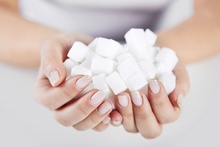
Sugar is ubiquitous in today’s food supply and is found in approximately 75% of all packaged foods [1]. A high intake of sugar is associated with a range of adverse health outcomes including obesity [2], type 2 diabetes [3], and cardiovascular disease [4].
A recent paper published in Medical Hypotheses examined the relationship between the consumption of added sugars in the diet and depression [5]. The researchers noted that major depressive disorder may be affected by poor dietary habits [6, 7], and they hypothesised that added dietary sugars, particularly a high consumption, poses a serious risk factor for depression.
Despite there being a paucity of evidence demonstrating a causative link between added sugar consumption and depression, there are several pathophysiological effects of sugar, which highlight its depressogenic potential.
The potential mechanisms through which sugar may lead to depression include:
Systemic inflammation is recognised as a major contributor to the development of depression, with several inflammatory markers being elevated in depressed individuals [8]. Research has demonstrated that increased sugar intake can elicit a pro-inflammatory response in the body [9]. Not only does sugar cause a systemic inflammatory response within the body, but it may also trigger a specific inflammatory response in the brain (neuroinflammation), leading to impaired cognitive function [10]. Systemic inflammation is also associated with several other mechanisms through which sugar may contribute to depression. This includes is negative effects on serotonin and cortisol; both of which are disturbed in people with depression.
The relationship between the gastrointestinal tract and the brain, the gut-brain axis, is well-established. Dysbiosis, a condition comprising an imbalance in intestinal bacteria, is associated with psychological dysfunction, including depression [11]. Several animal studies have identified a relationship between the consumption of a high-sugar diet and dysbiosis, with mechanisms including suppression of beneficial bacteria [12], the development of small intestinal bacterial overgrowth (SIBO) [13], and the translocation of lipopolysaccharides, also known as endotoxin, from the intestinal lumen into the systemic circulation, resulting in an inflammatory response [14]. Moreover, depressed individuals are more likely to have gastrointestinal hyperpermeability (‘leaky gut’) [15], and elevated numbers of intestinal bacteria associated with inflammation [16].
The neurotransmitter, dopamine, regulates reward signalling in the brain and is associated with feelings of pleasure. Any dysfunction in its signalling may result in a depressive state, resulting from a down-regulation of dopamine’s production and/ or activity [17]. Sugar is one of many compounds that stimulates the production of dopamine in the brain. However, animal research has demonstrated that chronic sugar consumption results in a down-regulation of the dopamine response and may lead to depressive symptoms [18].
Insulin resistance is a condition that results from a down-regulation of insulin receptors on cell membranes. This limits insulin’s binding capacity and therefore, the ability of glucose to enter the cells to be used as a fuel source. Excessive sugar intake is strongly associated with insulin resistance, with researchers able to induce the condition in rodents using a high-sugar diet [19]. Not only does insulin resistance limit the uptake of glucose into the muscles and liver, but it also limits the uptake into the brain, potentially leading to the development of depression [20].
Oxidative stress is a physiological state characterised by an inability of the body to regulate the amount of reactive oxygen species being produced in the body. This results in damage to tissues and potentially, cellular dysfunction. Research has demonstrated that depression is associated with elevated concentrations of oxidative stress markers, such as malondialdehyde. Moreover, excessive sugar consumption may induce oxidative stress in humans [21]. In combination with other factors such as inflammation, oxidative stress may contribute to depression.
AGEs are formed from a reaction between sugar molecules and protein, lipids, or other compounds in the body. Excessive sugar consumption increases the availability of sugar for the formation of AGEs [22]. Research by van Dooren et al., [23] noted a strong association between levels of AGEs and the incidence of depression in adults. Moreover, depressed individuals tend to have low levels of protective molecules that neutralise AGEs before they can cause damage to the body [24].
Overall, diet certainly plays a major role in the development of depression and other mental health disorders. Therefore, encouraging people to review their diet and make small, but meaningful changes, such as reducing sugar intake, may go a long way towards helping them achieve better physical and mental health outcomes.
If you are experiencing mental health problems and believe that your diet may be affecting you, speak to a competent natural health practitioner.
Session expired
Please log in again. The login page will open in a new tab. After logging in you can close it and return to this page.